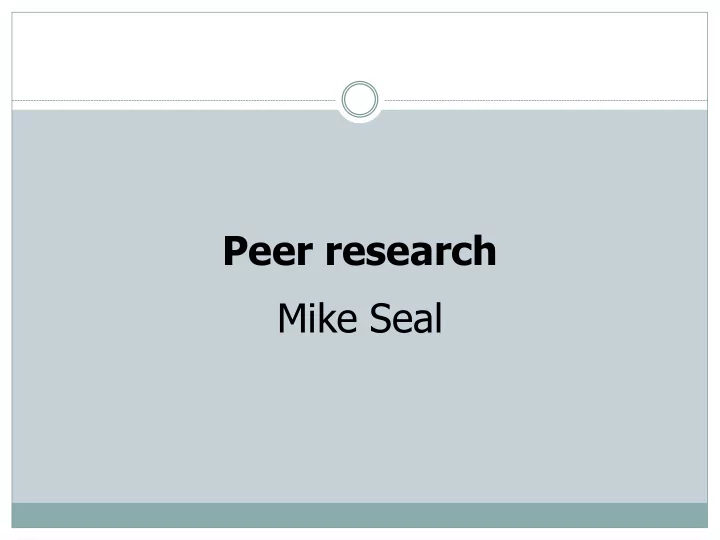

Peer research Mike Seal
Journey User of mental health and drug services Volunteer Practitioner Manager/ Development worker Trainer/ researcher consultant Academic
Peer research conducted Critical incidents in entrenched rough sleepers exiting homelessness – Groundswell Touch: street youth work interventions with young people involved with violence Revolving doors: peer research in probation Commissioning together: multiple exclusion peer research Homeless Health Initiative report (2009) Queens Nursing Institute l Client review of health services (2009) Herfordshire Primary Care Trust l Streets Ahead: good practice in tackling Rough Sleeping: client perspectives (2008) DCLG l London Borough on Croydon: Client consultation report (2008) Croydon City Council l Telford and Wrekin: Client perceptions on homeless strategy (2008) Telford City Council l Client perceptions on the Homelessness strategy (2008) Liverpool City Council l East Midlands Homelessness Strategy (2007) (User involvement aspect) Centre for Urban Studies, Birmingham University l Being supported: user perspectives on Supported People funded Services, (2006) Groundswell: London
latest Critical incidents in entrenched rough sleepers exiting homelessness – Groundswell Touch: street youth work interventions with young people involved with violence Revolving doors: peer research in probation Commissioning together: multiple exclusion peer research
Why peer research? 1. Claims about power and epistemology (knowledge) 2. Claims about the nature of the data that peer researchers can obtain 3. Claims about the emancipatory and empowering impact of using peer researchers 4. Trendy and hard to argue with? (Banardos:2006,Burns and Schubotz:2009, France:2000, Freeman et al. 1996; Kaseniemi 2001; Griesel et al 2002; Involve:2004, NYA:2010, Winston 2007) .
But.... Dangers of tokenism (Arnstein:1968, Hart:1992) Tyranny of the group (Cooke:2001) Simplistic notions of peer/ community (Gujit and Shah 1998)
Bu But t but ut •Don’t underestimate power to understand complicated research skills •Don’t underestimate transferable skills that people have •Don’t be picky about where you involve people, they will express if they do not understand. •Let research grow from skills but don’t be afraid to push and challenge people • Be prepared to push your own boundaries
Power and knowledge l arising from insights of feminist research into the construction of knowledge and the falsity of ‘objectivity’ (Bowles and Duell, Klein, 1983; Coppock:2011, Smith, 1974; Stanley and Wise, 1983). l One of the central tenants of participatory research (Cooke and Kothari: 2004, Kumar: 2002, Petty et al:1995) is to work with letting unheard voices be heard but not descend into romanticisation of the other. l peer research reduces the inherent power imbalances within research by involving people in the process and that they therefore have a stake in knowledge creation (Kilpatrick et al: 2007).
Reality and thoughts The professional researcher has power of determining what constitutes research and knowledge Take time to deconstruct knowledge (every one want to do questionnaires!) and ethics (everyone wants to do secret shopping) There is power is the symbolism of peers, people can see that knowledge creation is something they can be involved in Equally involve workers and other stakeholders or they will sabotage – make it pushy but real.
Data peers can obtain (Hobbiss et al: 1 998, Kirby: 1999) • 'experts on their own lives' • able to relate to those with experience better • less intimidating than other adults • able to talk the same language •being able to talk about ‘taboo’ subjects with peers • ability to share common experiences • being on the same side •able to make the interview situation ‘informal’.
but traditionally in research it is accepted that the observer and the observed should not “contaminate” the other (Du Bois) Sometimes people are more likely to talk to stranger (Simmel:1921) For issues like gender (McLaughlin 2005) and local accent (McCartan et al. 2004) it can be detrimental to the relationship between them
But, but……. Importance of developing “conscious partiality” (Mies:1983, p123),contingent self revelation and leverage in order to challenge and shake up life world near peer – close enough to feel safe, but different to challenge and be a blueprint self & poxy trust Power of symbolism of peer researchers See it as a pedagogic process
research is also justified in terms of efficiency in that it encourages closer intimacy and fuller discussion between researchers and researched, and fuller understanding of the data. (Alderson, 2001, p. 140)
Recommend
More recommend